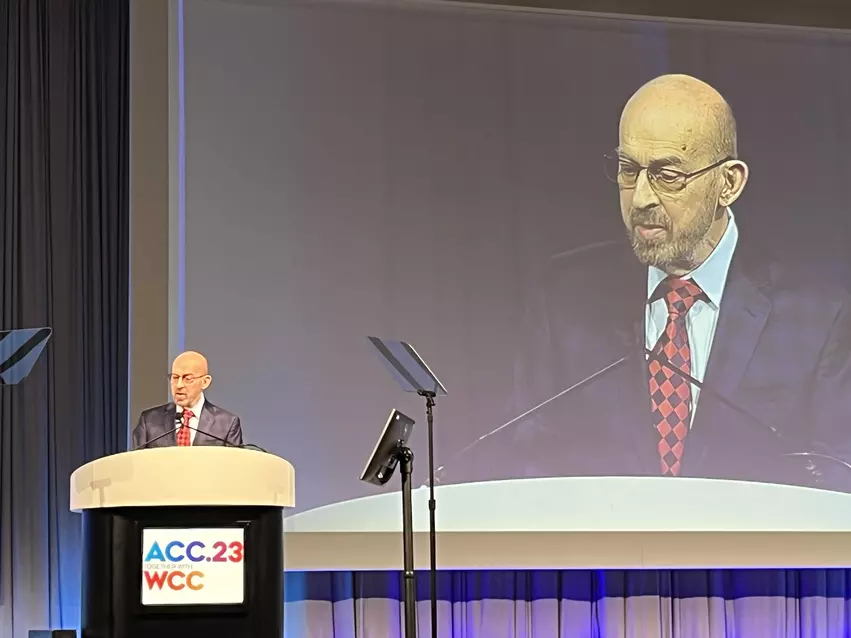Day 1 at ACC.23 features late-breaking studies on bempedoic acid, tricuspid valve repair and statins
The American College of Cardiology (ACC) kicked off its annual meeting, ACC.23 Together with the World Congress of Cardiology (WCC), with a series of late-breaking clinical trials that had attendees talking for the rest of the day.
Bempedoic acid among statin-intolerant patients
After opening remarks from ACC President Edward T.A. Fry, MD, and WCC President Daniel José Piñeiro, MD, the first late-breaking results of the day were presented by Steven E. Nissen, MD, chief academic officer of the Cleveland Clinic’s Heart Vascular & Thoracic Institute. Nissen presented findings from the CLEAR Outcomes trial, which examined the impact of bempedoic acid on nearly 14,000 statin-intolerant patients.
Overall, Nissen told attendees bempedoic acid was linked to a significant reduction in the study’s composite endpoint of cardiovascular death, heart attack, stroke and coronary revascularization. This included a 23% reduction in heart attacks and a 19% reduction in coronary revascularizations.
One key takeaway from the results was that 48% of patients included in the trial were women. With so many in the specialty pushing for more women to be included in clinical trials, it was no surprise that the large room full of cardiologists applauded at this detail. (Women are also more likely to be statin intolerant than men, making it especially important to see that number as close to 50% as possible.)
In addition, the reduction in LDL cholesterol associated with bempedoic acid was technically lower than what is typically seen with statin therapy, but findings suggest bempedoic acid still represents an alternative when statins are not an option.
Esperion Therapeutics, the pharmaceutical company behind bempedoic acid, shared its excitement about these findings in a prepared statement. The company markets bempedoic acid under the name Nexletol.
“Esperion expresses its great appreciation for all the people that brought CLEAR Outcomes to completion, especially the patients and investigators and their colleagues at clinical sites that participated in this study,” said Sheldon Koenig, president and CEO of Esperion. “We are incredibly proud that we have successfully completed a four-year cardiovascular outcomes study during a global pandemic and these results have the potential to bring significant benefits to the millions of primary and secondary prevention patients who are unable to reach their goals with current therapies. These results are practice changing and exceed our expectations.”
Read the team’s full analysis here.
The safety and effectiveness of tricuspid valve regurgitation with the TriClip device
Next up was Paul Sorajja, MD, chair of the Valve Science Center at the Minneapolis Heart Institute Foundation, who shared data from the TRILUMINATE study.
TRILUMINATE was focused on the safety and effectiveness of Abbott’s TriClip transcatheter edge-to-edge repair (TEER) system for tricuspid heart valve repair. Overall, the TriClip device was linked with significant improvements in both tricuspid regurgitation (TR) and quality of life. Greater TR reductions were linked to bigger improvements in quality of life. The device was also found to be quite safe; the 30-day major adverse event rate was 1.7%.
One point emphasized by the panel after Sorajja’s presentation was that TriClip was not associated with an improvement in cardiovascular mortality. The other benefits, however, still suggested to the panel that TEER with the TriClip device can make a significant impact on care for a patient population that is incredibly sick and often has limited options.
Abbott shared its own prepared statement about the findings to highlight TriClip’s triumph.
“These TRILUMINATE Pivotal data show TriClip is the first minimally invasive device therapy for the treatment of tricuspid regurgitation to provide durable improvements in TR severity and quality of life that go beyond taking medication to manage symptoms,” said Michael Dale, senior vice president of the company’s structural heart business. “When left unaddressed, TR can be debilitating and life-threatening. By repairing the damage caused by structural heart disease, TriClip G4 and our latest technological innovations are helping people reclaim their lives so they can get back to doing what they love.”
Read the team’s full findings here.
Statin therapy among cancer patients undergoing chemotherapy
Thomas Neilan, MD, director of the cardio-oncology program at Massachusetts General Hospital in Boston, delivered the final late-breaking clinical study of the morning, highlighting his team’s research on atorvastatin among patients exposed to anthracyclines.
The STOP-CA trial focused on 300 patients undergoing chemotherapy for lymphoma. Overall, the study’s primary endpoint—patients experiencing a decline in left ventricle ejection fraction (LVEF) of 10% or more—was seen in 22% given a placebo for 12 months and 9% of patients given atorvastatin for 12 months. A LVEF reduction of 5% or more was also more common among patients treated with atorvastatin.
This was a relatively small sample size; follow-up research will still be required. Neilan did note during his presentation that one drug is approved by the FDA to reduce anthracycline-related cardiotoxicity, dexrazoxane, but it is infrequently used due to “potential secondary effects.”


